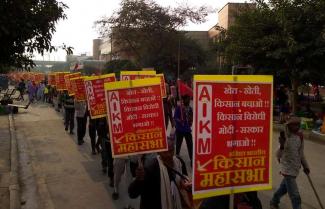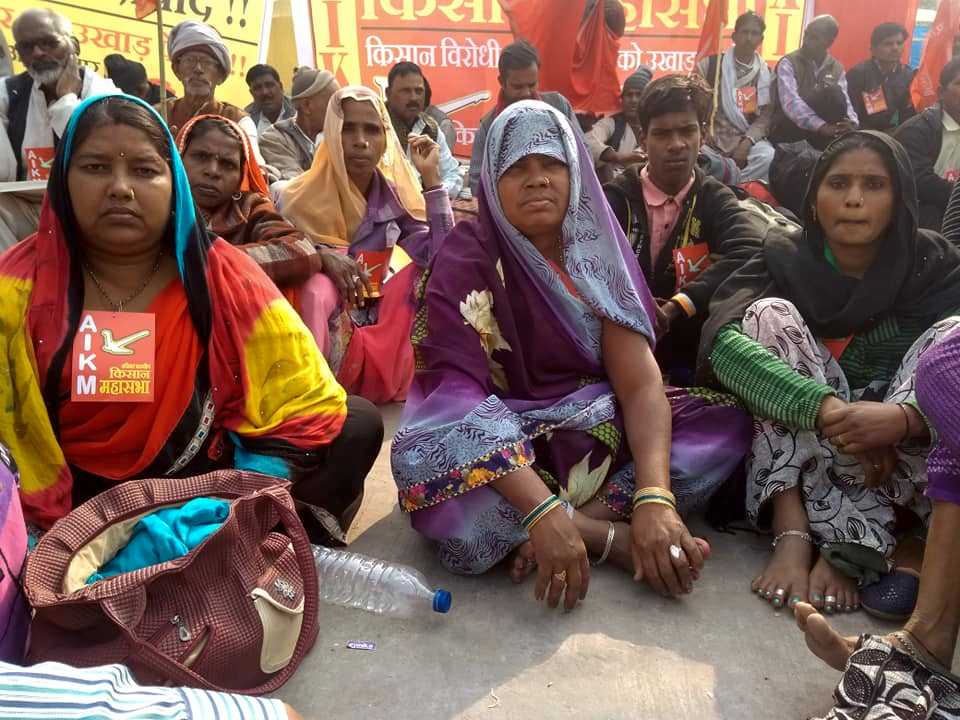
Adopted by an assembly representing the farmers of India on the occasion of the historic Kisan Mukti March organised by the All India Kisan Sangharsh Coordination Committee, Delhi, 30 November 2018
WE, THE FARMERS OF INDIA,
The producers of primary agricultural commodities;
Including Women, Dalit, Nomadic and Adivasi farmers;
Landowners, Tenants, Sharecroppers, Agricultural Labourers and Plantation Workers;
Fishworkers, Milk Producers, Poultry Farmers, Livestock Rearers, Pastoralists, and Collectors of Minor Forest Produce; and,
Everyone engaged in crop cultivation, shifting cultivation, apiculture, sericulture, vermiculture, and agro-forestry;
CONVINCED THAT
Wellbeing of farmers is not just about economic survival of a majority of Indian households, it is about retaining our national dignity and our civilisational heritage;
Farmers are not just a residue from our past; farmers, agriculture and village community are integral to the future of India and the world; and,
The demands of the farmers’ movements are fully consistent with our Constitutional vision, Fundamental Rights and Directive Principles of State Policy;
RECOGNISING OUR RESPONSIBILITY
As honest hard workers who face numerous odds;
As bearers of historical knowledge, skills and culture;
As agents of food safety, security and sovereignty; and
As guardians of biodiversity and ecological sustainability;
RECALLING THE PRINCIPLES OF
Economic viability;
Ecological sustainability; and
Equality with social and economic justice;
YET ALARMED AT
Economic, ecological, social and existential crisis of Indian agriculture;
Ecological degradation and destruction affecting farmers and their livelihoods;
Unprecedented increase in diversion and destruction of agricultural land, privatisation of water, forced displacement, deprivation and migration affecting security of food and livelihood;
Persistent state of neglect of agriculture and discrimination against farming communities;
Increasing vulnerability of farmers to extortion by the village powerful and government officials;
Deepening penetration of large, predatory and profiteering corporations that are already in control of significant sectors of Indian agriculture;
Spate of farmers’ suicides across the country and unbearable burden of indebtedness;
Alarming deaths of adivasi and dalit children due to hunger and malnutrition;
Widening disparities between farmers and other sectors in our society; and,
Growing attack of the governments on the farmers’ struggles;

SOLEMNLY AFFIRM OUR CONSTITUTIONAL RIGHT TO
Life and dignified livelihood;
Social security and protection against natural and other calamities;
Land, water, forest and all natural resources including common property resources;
Diversity in seeds, food systems and sustainable technological choices; and,
Freedom of expression, organisation, representation and struggle through constitutional means for realisation of our demands and shaping our future;
THEREFORE, CALL UPON THE PARLIAMENT OF INDIA TO IMMEDIATELY
Hold a Special Session to address the agrarian crisis by passing and enacting the two Kisan Mukti Bills that are of, by and for the farmers of India, namely,
1. The Farmers’ Freedom from Indebtedness Bill, 2018; and
2. The Farmers’ Right to Guaranteed Remunerative Minimum Support Prices for Agricultural Commodities Bill, 2018.
AND ALSO DEMAND THAT THE GOVERNMENT OF INDIA MUST:
- Increase the number of guaranteed employment days under MGNREGS to 200 days per family, and ensure wage payment within the period guaranteed by statute and at par with legal minimum wages for unskilled farm labour;
- Reduce the cost of inputs for farmers either by regulating industry price or offering subsidy directly to farmers;
- Provide comprehensive social security for all farm households including pension @ at least Rs. 5,000 per month per farmer above the age of 60;
- Universalise the benefits of the Public Distribution System including cereals and nutri-cereals, pulses, sugar and oils without linking it to Aadhar or biometric identification and without shifting to direct cash transfer;
- Address the menace of stray animals by removing all legal and vigilante-imposed restrictions on cattle trade, compensating farmers for destruction of crops by wild and stray animals and supporting animal shelters;
- Stop land acquisition or land pooling without informed consent of the farmers; no acquisition or diversion of agricultural land for commercial land development or for creation of land banks; prevent the bypassing or dilution of The Right to Fair Compensation and Transparency in Land Acquisition, Rehabilitation and Resettlement Act, 2013 at the central and state level; and evolve land use and agricultural land protection policy;
- Mandate the sugar mills to pay interest @ 15% p.a. if cane dues are not paid to the cane-growers within 14 days of the delivery of cane; FRP of cane to be fixed by linking it to 9.5% recovery of sugar;
- Withdraw pesticides that have been banned elsewhere and not approve GM seeds without a comprehensive needs, alternatives and impact assessment;
- Disallow Foreign Direct Investment in agriculture and food processing, and remove agriculture from Free Trade Agreements, including the proposed Regional Comprehensive Economic Partnership (RCEP);
- Require identification and registration of all real cultivators including tenant farmers, sharecroppers, women farmers, lessee cultivators and rural workers etc. for purposes of accessing benefits of all government schemes; and
- Stop uprooting adivasi farmers in the name of afforestation, ensure strict implementation without dilution of Panchayat (Extension to Scheduled Areas) Act and Forests Rights Act, 2006;
AND, FURTHER, URGE THE GOVERNMENT TO EVOLVE POLICIES TO - Provide land and livelihood rights to the landless, including agricultural and homestead land, water for fishing, mining of minor minerals etc;
- Ensure timely, effective and adequate compensation for crop loss due to natural disasters; implement a comprehensive crop insurance that benefits farmers and not just insurance companies and that covers all types of risks for all crops and for all farmers, with individual farm as the unit of damage assessment; reverse anti-farmer changes in the Manual for Drought Management;
- Build assured protective irrigation through sustainable means for farmers, especially in the rain-fed areas;
- Ensure remunerative guaranteed prices for milk and its procurement for dairies and to supplement nutritional security through Mid Day Meal Scheme and Integrated Child Development Scheme etc;
- Waive off all outstanding agricultural loans of farmers from suicide-affected families and provide special opportunities to children of such families;
- Protect the farmers from corporate plunder in the name of contract farming by reviewing the Contract Farming Act 2018;
- Promote procurement, processing and marketing under Farmer Producer Organisations and Peasant Cooperatives instead of corporatisation of agriculture and takeover by MNCs; and
- Promote an agro-ecology paradigm that is based on suitable cropping patterns and local seed diversity revival, so as to build economically viable, ecologically sustainable, autonomous and climate resilient agriculture.
Liberation Archive
- 2001-2010
-
2011-2020
- 2011
- 2012
- 2013
- 2014
- 2015
- 2016
- 2017
- 2018
-
2019
-
JANUARY-2019
- Oust the Fascist Modi Regime! Rescue India, Rebuild India!
- Assembly Elections 2018: A Blow To Fascist Politics
- The Elitist Reaction to the Zomato Delivery Man
- More Orders, More Money
- Why I Stole food
- Kisan Mukti March : When United Peasant Resistance Defused The Fascist Aggression
- Kisan Mukti March : The Farmers' Freedom March
- Kisan Mukti March : Civil Society and Opposition Parties Come out in Support
- MANIFESTO OF INDIAN FARMERS
- Farmers' Unity will become the Biggest Force in Fighting Fascism
- Save Our Farmers
- The Fraud of Farm Suicide Numbers
- Agrarian Crisis = Nation's Crisis
- Sinking in a Sea of Debt
- Why The Market Has Not Worked For Farmers
- Agrarian Crisis: A Crisis of Women Farmers
- Overworked, Underpaid, Unrecognised: Bihar ASHAs on Indefinite Strike
- Seminar: 'Women's Rights and Increasing Attacks on Democracy'
- Supreme Court as Custodian of the Constitution
- Comrade Vinod Mishra's Bhojpur
- Why Supreme Court Order Doesn't Amount to 'Clean Chit' to Modi Government on Rafale
- All Over The World, Home Is The Most Unsafe For Women
- FEBRUARY-2019
- MARCH-2019
- APRIL-2019
- May-2019
- LIBERATION, JUNE 2019
- Liberation JULY 2019
- LIBERATION, August 2019
- Liberation, SEPTEMBER 2019
- Liberation, OCTOBER 2019
- Liberation, NOVEMBER 2019
- Liberation, DECEMBER 2019
-
JANUARY-2019
- 2020
- 2021-2030
Charu Bhawan, U-90, Shakarpur, Delhi 110092
Phone: +91-11-42785864 | Fax:+91-11-42785864 | +91 9717274961
E-mail: info@cpiml.org







